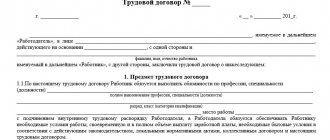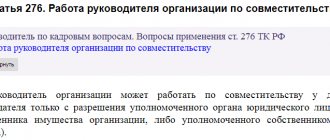Employers and employees often look for opportunities to resolve disputes between them in some way.
Dear readers! To solve your specific problem, call the hotline or visit the website. It's free.
8 (800) 350-31-84
One of these methods should be considered a collective agreement. However, in some cases, organizations do not have a trade union that could in any way represent the interests of employees in the collective agreement.
Parties to a collective agreement
The parties to the agreement are the employees of the enterprise, as well as its administration or employer.
Both trade unions and other employee associations authorized by a majority can act on behalf of employees.
On the employer's part, the director or other authorized person has the right to sign the agreement. If the employer is an individual entrepreneur, then he will sign the collective agreement individually or through a representative who fully possesses the information necessary for negotiations and dispute resolution (Part 1, Article 33 of the Labor Code of the Russian Federation, Article 40 of the Labor Code of the Russian Federation).
As a rule, there are no trade unions in small enterprises. In this case, the agreement can be signed by a representative of the labor collective, specially elected for this case at the general meeting of the labor collective.
The election of an employee representative must be recorded in the minutes of the meeting so that there is no doubt about the authority of the representative and the validity of the collective agreement.
What is a collective agreement?
A collective agreement is an agreement between an organization and employees (Article 40 of the Labor Code of the Russian Federation).
After signing a collective agreement, it becomes the basis of legal relations in the enterprise, since it is binding on both the owner of the enterprise (its administration) and all employees. The period for which this agreement is signed is 3 years maximum. However, its content should not limit the rights and guarantees of personnel provided by law.
Is a collective agreement required at an enterprise?
No legal act obliges the employer to have such an agreement at the enterprise.
In a situation where neither the employer nor the employees insist on signing a collective agreement, all legal relations that arise between them will be regulated by the provisions of labor legislation. In this case, liability for the absence of a collective labor agreement is not provided (appeal ruling of the Khabarovsk Regional Court dated January 28, 2015 in case No. 33-418/2015 (33-8628/2014).
If employees want to enter into a collective agreement, can the employer refuse?
If a trade union body or other employee representative sent a letter to the employer’s administration about the start of collective negotiations and the signing of a collective agreement, the employer does not have the right to refuse.
That is, the answer to the question: “Is a collective agreement mandatory or not” is changing. The employer has an obligation to conclude an agreement from the moment it receives the employees’ request. And an employer who sabotages the conclusion of a collective agreement will bear responsibility (Articles 5.28, 5.29, 5.30 of the Code of Administrative Offenses of the Russian Federation).
If in this case the labor inspectorate establishes the fact of unjustified refusal to participate in negotiations, the employer can be held liable under Art. 5.28 of the Code of Administrative Offenses of the Russian Federation (determination of the St. Petersburg City Court dated May 30, 2011 No. 33-8007/11). True, the fine under Article 5.28 is small - from 1000 to 3000 rubles.
The same liability threatens under Art. 5.29 of the Code of Administrative Offenses of the Russian Federation, if the initiative group or trade union is not provided with information, it is necessary to conclude a collective agreement.
If the employer directly and unreasonably refused to conclude a collective agreement, then he may be fined under Art. 5.30 Code of Administrative Offenses of the Russian Federation - from 3000 to 5000 rubles. Unfortunately, the law does not determine which refusal is justified and which is unjustified; Rostrud also did not explain this point. All that remains is to focus on the well-known patronage of regulatory bodies for workers: it is better not to refuse to conclude a collective agreement and not to violate the collective bargaining procedure.
Find out in detail who can be punished under Art. 5.28-5.30 Code of Administrative Offenses of the Russian Federation, read in the ConsultantPlus system. We offer you to obtain free access to ConsultantPlus for 2 days - via the link.
Please note that for all three articles - 5.28, 5.29, and 5.30 - the period of prosecution is increased (instead of the standard 3 months - 1 year from the date of the offense).
As practice shows, the initiative to adopt a collective agreement is shown primarily by employees. However, the employer may also make a proposal to conclude it, but the employees will not show any desire to create a body representing their interests. In this case, it is impossible to oblige employees to participate in negotiations.
Collective agreement: is the employer obliged to conclude it?
Yuri NEKRASOV, lawyer Published: Personnel Affairs Magazine No. 4 February 2003
Nowadays, management and personnel officers of small and medium-sized businesses often wonder whether the organization needs a collective agreement. On the one hand, the Labor Code speaks of the right, and not the obligation, of the employer to conclude a collective agreement. But on the other hand, the Code of Administrative Offenses provides for liability associated with the employer’s reluctance to participate in its conclusion. Let us explain the controversial issues related to the collective agreement.
A collective agreement is a local normative act that should increase the legal and social guarantees of workers compared to those provided for by labor legislation. At the same time, the collective agreement also contains the obligations of its parties - the employer and employees.
In the Labor Code of the Russian Federation, a whole chapter is devoted to collective agreements (Chapter 7). But with the advent of the code, the previously in force Federal Law of March 11, 1992 “On Collective Bargains and Agreements” did not lose force.
Article 40 of the Labor Code of the Russian Federation gives the following definition of a collective agreement: “A collective agreement is a legal act regulating social and labor relations in an organization and concluded by employees and the employer represented by their representatives.” In the code, an organization is understood as the organization as a whole, its branches, representative offices and other separate structural units, which can also conclude their own collective agreement.
The principle of “everything that is not prohibited by law is permitted” is applied to the terms of the collective agreement (in accordance with the Convention on Freedom of Association and Protection of the Right to Organize of the International Labor Organization No. 87. The collective agreement is concluded for a period of no more than three years and comes into force from the date of signing by its parties or from the date established by the collective agreement.
The conclusion of a collective agreement is voluntary. Articles 21 and 22 of the Labor Code of the Russian Federation provide for the right, and not the obligation, of the employee and employer to conclude a collective agreement. In addition, no one can force an employee to join an already concluded agreement (Article 21 of the Labor Code of the Russian Federation does not contain an obligation for an employee to join a collective agreement).
Thus, it would be a completely legitimate situation if neither the owner of the organization nor the workforce wants to enter into a collective agreement, but will limit themselves only to mandatory labor contracts. In this case, the employer will not bear any responsibility for the fact that there is no collective agreement in the organization.
In other words, as long as none of the parties has taken the initiative to conclude a collective agreement, there is only the right to conclude it. The employer's obligations arise only after official written notification from employees about the start of collective bargaining.
This means that only the employer can be held administratively liable for violations related to the collective agreement by the labor inspectorate, and only if he has already received a notice from employees with a proposal to start collective bargaining and has committed a corresponding violation. For example, he unreasonably refused to conclude a collective agreement or avoided participating in collective negotiations.
Typically, the initiators of the contract are the employees. The Labor Code of the Russian Federation does not provide for such an option when representatives of the employer are the initiators of the start of negotiations, and employees do not want to create their own representative body, although this may well be the case. It seems that in this case no one can oblige workers to negotiate.
The parties to the collective agreement are the employer and employees represented by their representatives. One side of the collective agreement is clearly defined in the Labor Code of the Russian Federation: this is the owner of the enterprise - the employer. But the second side, if there is no trade union organization at the enterprise, can be quite difficult to determine.
Meanwhile, in most small and medium-sized firms today there are no trade unions that express the interests of at least the majority of workers. For these cases, the law on collective bargaining agreements stipulates that representatives of employees may be public bodies formed at a general meeting (conference) of the organization’s employees and authorized by this meeting. Employees who are not members of a trade union may authorize a trade union body to represent their interests during collective negotiations, conclusion, amendment, addition of a collective agreement, agreement and monitoring their implementation.
There is also another extreme: there are several trade union organizations operating at the enterprise, each of which unites less than half of the workers. Or there is a powerful trade union representing the majority, and at the same time a small trade union organization is working.
In this case, one must be guided by the Labor Code, from which it follows that there is only one collective agreement at the enterprise. Therefore, trade unions are first of all obliged to decide on the creation of a single body, which should include representatives of all trade unions on a proportional basis. Even if one union has only a few workers, and another has hundreds, the single commission will include at least one official representative of the small union. If such a body cannot be created (the trade unions could not agree), then the employer enters into negotiations with the majority union.
Thus, the Labor Code of the Russian Federation quite harshly pushes trade unions to sit down at the negotiating table and come to an agreement. First among themselves, and then with the employer. But even the absence of a single body does not deprive small trade unions of the right to participate in the negotiation process. They can join the dialogue with the employer at any time and officially participate in negotiations until the signing of a collective agreement (Part 6, Article 37 of the Labor Code of the Russian Federation). The workers themselves, who are members of small trade unions, are interested in this, since otherwise they will lose the right to representation at the appropriate level. At the same time, the number of representatives of small trade unions must correspond to the number of their members. And the voting result depends on the number of representatives.
It may also be that none of the trade unions working at the enterprise represents the majority of workers. In this case, the first step is the same, that is, again a single body must be created to represent the interests of workers. If they fail to reach an agreement, the issue is resolved at a general meeting of the team or at a conference.
Representatives on the employer's side during negotiations on concluding a collective agreement can be officials who manage the enterprise. Those who have the information necessary for negotiations, appropriate qualifications and experience, for example, heads of enterprises, their structural divisions, legal advisers, personnel department employees, sociologists, etc. At the discretion of the employer, persons who do not work at this employer can also act as its representatives enterprise, but having some experience in collective bargaining, for example, experts from employers' associations, lawyers.
Collective bargaining must begin no later than seven days after the employee representatives notify the employer in writing.
If, within three months from the date of the start of collective negotiations, agreement between the parties on certain provisions of the draft collective agreement is not reached, then the parties must sign a collective agreement on the agreed terms and simultaneously draw up a protocol of disagreements. The collective agreement comes into force even if there are some disagreements in it. Unresolved differences may be subject to further collective bargaining. Contents and structure of the collective agreement
The Labor Code contains an approximate list of issues, obligations on which may be included in the contract (Article 41 of the Labor Code of the Russian Federation). This list is advisory in nature and is intended to give the drafters of a collective agreement an idea of its possible content and structure.
There are five groups of issues included in the collective agreement.
The first group is the forms, systems and amounts of remuneration, the mechanism for regulating remuneration taking into account rising prices, the level of inflation, and the fulfillment of indicators determined by the collective agreement; duration of working hours and rest time, including issues of granting and duration of vacations, labor conditions and safety, benefits for certain categories of workers.
The second group consists of obligations to ensure the employment of workers or provide them with special benefits upon release from the enterprise, the possibility of retraining in other professions.
The third group includes norms regulating social services for workers and labor protection. Among them are compensation for transportation costs, organization and provision of subsidies for food for workers at work, and labor protection measures. The drafters of the draft collective agreement will find a more detailed presentation of these issues in Appendix No. 2 to the letter of the Department of Labor Safety of the Ministry of Labor of Russia dated January 23, 1996 No. 38-11 - Recommendations on the approximate content of the section “Working Conditions and Safety” in the collective agreement, which provides for the employer’s obligations to the labor force. by the organization's staff in the field of labor conditions and safety. The fourth group consists of specific norms, about which laws and other regulatory legal acts (for example, industry ones) contain direct instructions on the mandatory enshrinement of these provisions in a collective agreement. The fifth group includes the obligations of the labor collective to abandon strikes if the relevant conditions of the collective agreement are met.
When determining the content of a collective agreement at a particular enterprise, it is necessary to proceed from the financial capabilities of the employer and social problems relevant to the given production and team.
Unfortunately, the practice of concluding collective agreements has also revealed negative phenomena. Some collective agreements contain provisions that directly violate labor laws, such as increasing the duration of overtime or the possibility of engaging in overtime at the discretion of the management without complying with the conditions established by law. Sometimes the collective agreement stipulates that employees perform duties not provided for in the employment contract (working out a certain standard working time in the subsidiary farm of the enterprise). The collective agreements of some enterprises include provisions that expand the range of disciplinary measures, such as fines for violation of labor discipline. This practice must be declared illegal. The above standards worsen the employee’s position in comparison with current legislation and therefore, in accordance with Article 9 of the Labor Code of the Russian Federation, must be declared invalid.
Registration of a collective agreement is not mandatory, but is only of a notification nature and is carried out within seven days from the date of signing the agreement. The signed collective agreement is sent by the employer's representative to the relevant labor authority (the labor committee of the local government). The entry into force of a collective agreement or agreement does not depend on the fact of their notification registration. When registering a collective agreement, the relevant labor authority identifies conditions that worsen the situation of workers in comparison with the Labor Code, laws, and other regulatory legal acts, and reports this to the representatives of the parties who signed the collective agreement, as well as to the relevant state labor inspectorate. The terms of the collective agreement that worsen the situation of employees are invalid and cannot be applied.
Monitoring the implementation of the collective agreement can be carried out by representatives of workers, employers, executive authorities and local governments, as well as the labor inspectorate.
Employers are obliged to provide these representatives and bodies with the information necessary to monitor compliance with the collective agreement.








